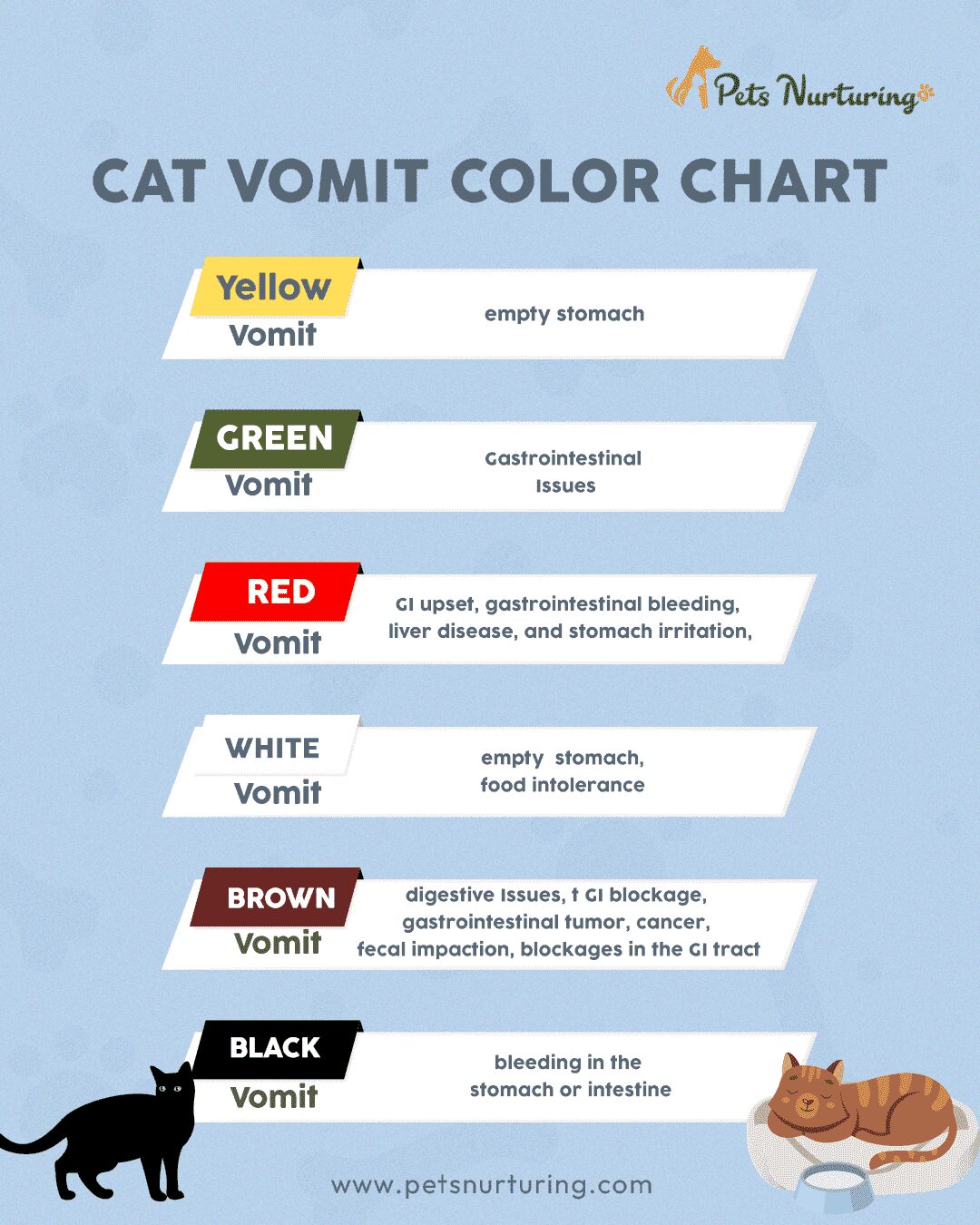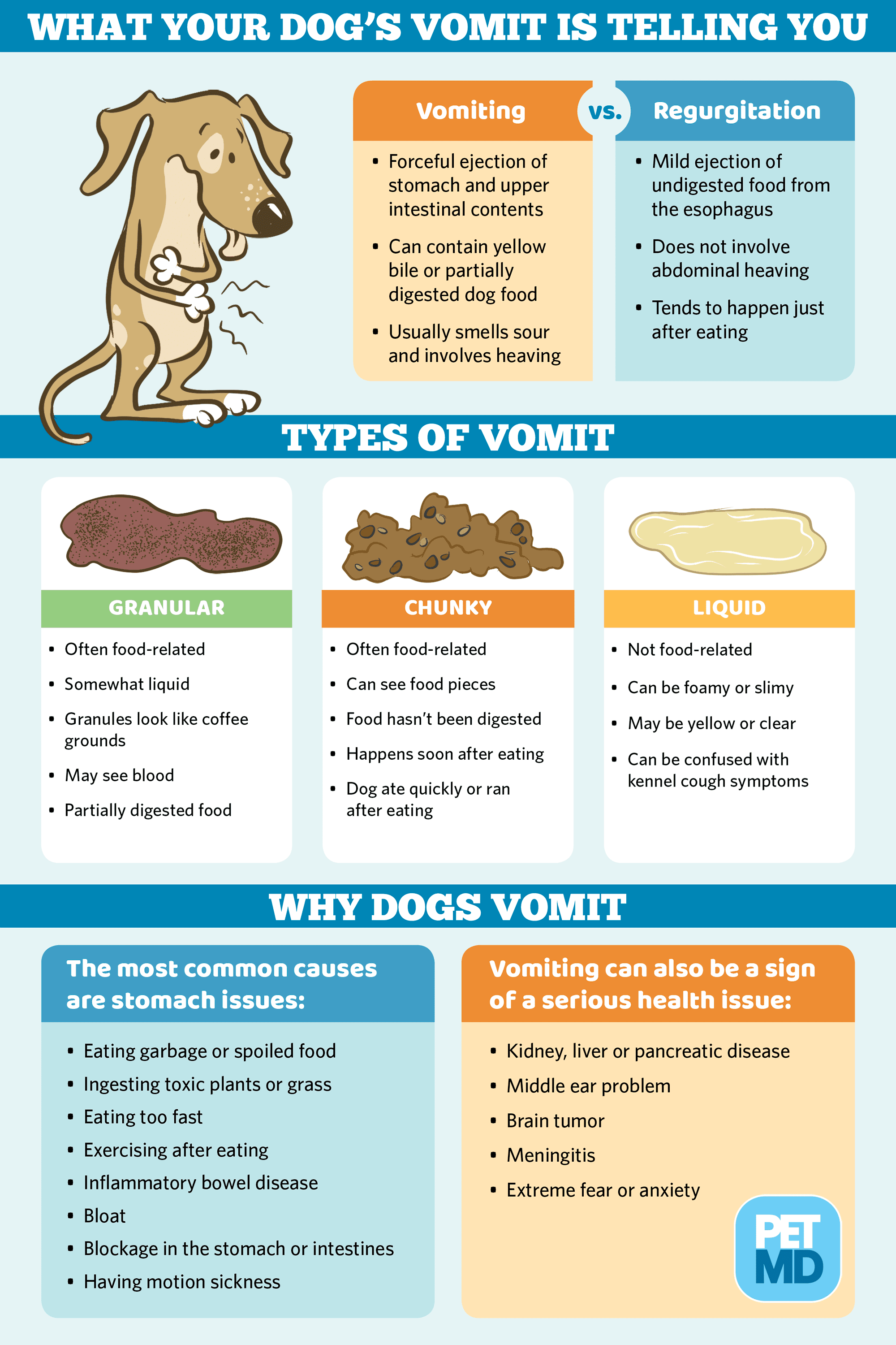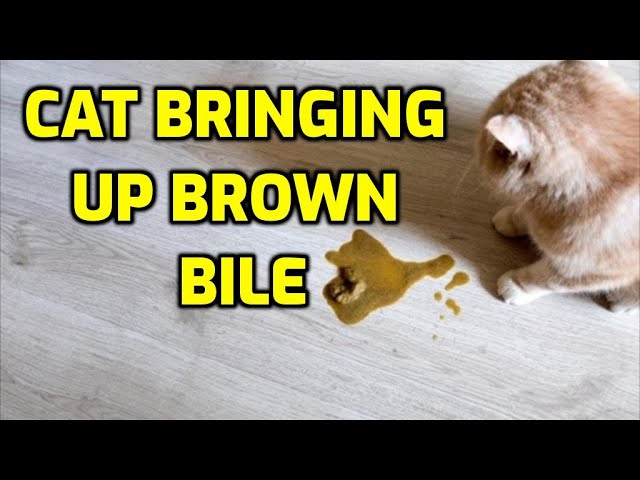Are you a cat owner who has ever been concerned about your furry friend vomiting white foam? If so, you're in the right place! In this article, we will explore the reasons behind this peculiar behavior and provide you with valuable insights to address this concern. Understanding why your cat is vomiting white foam is essential for their overall health and well-being. By delving into this topic, you will gain the knowledge needed to take proper care of your beloved pet. So, let's dive in and uncover the mysteries behind cat vomit together!
Key Takeaways:
- Cat vomiting white foam can be caused by various factors, including hairballs, dietary issues, or gastrointestinal problems.
- If a cat is consistently vomiting white foam, it is important to monitor their behavior and consult a veterinarian if the issue persists or worsens.
- Hairballs are a common cause of cats vomiting white foam, and regular grooming and use of hairball remedies can help prevent this.
- Dietary changes or food allergies may also contribute to a cat vomiting white foam, so it may be necessary to switch to a different type of food or consult a veterinarian for advice.
- In some cases, cat vomiting white foam may indicate more serious underlying health issues such as pancreatitis or gastrointestinal blockages, so prompt veterinary attention is crucial for accurate diagnosis and treatment.
Why is it a concern when a cat vomits white foam?
When a cat vomits white foam, it can be a cause for concern. Vomiting is the body's way of getting rid of something that doesn't agree with it or is causing irritation. When a cat vomits white foam, it means that there may be something irritating their stomach or esophagus. It could also indicate an underlying health issue that needs to be addressed.
Vomiting can lead to dehydration and nutrient loss, which can be harmful to your cat's overall health. If your cat continues to vomit white foam or shows other signs of illness, it is important to seek veterinary care to determine the cause and provide appropriate treatment.
Possible causes for cats vomiting white foam
There are several reasons why cats may vomit white foam instead of food:
- Hairballs: Cats groom themselves by licking their fur, and sometimes they swallow hair in the process. This hair can accumulate in their stomachs and form hairballs, which can cause irritation and lead to vomiting.
- Dietary issues: Certain foods or ingredients in your cat's diet may not agree with their stomachs, leading to vomiting. It's important to feed your cat a balanced diet that suits their individual needs.
- Gastrointestinal disorders: Conditions such as gastritis (inflammation of the stomach lining) or gastroenteritis (inflammation of the stomach and intestines) can cause cats to vomit white foam. These conditions may be caused by infections, dietary indiscretion, or other underlying health issues.
Tips for preventing your cat from vomiting white foam at home
To help prevent your cat from vomiting white foam, you can try the following:
- Provide a balanced diet: Make sure your cat is eating a high-quality cat food that meets their nutritional needs. Avoid feeding them table scraps or foods that may upset their stomachs.
- Regular grooming: Brushing your cat regularly can help reduce the amount of hair they ingest while grooming, reducing the risk of hairballs.
- Slowly introduce new foods: If you're introducing a new food to your cat's diet, do it gradually over several days to allow their digestive system to adjust.
If your cat continues to vomit white foam despite these measures, it is important to consult with a veterinarian for further evaluation and treatment.
Reasons why cats may vomit white foam instead of food
When a cat vomits white foam instead of food, it can be concerning for pet owners. There are several reasons why this may occur. One possible reason is that the cat has eaten too quickly or ingested too much air while eating. This can cause the stomach to become irritated, leading to vomiting. Another reason could be hairballs. Cats groom themselves by licking their fur, and sometimes they swallow hair in the process. If the hair does not pass through the digestive system properly, it can accumulate in the stomach and cause vomiting. Additionally, certain medical conditions such as gastritis or gastrointestinal infections can also result in a cat vomiting white foam.
Eating Too Quickly or Ingesting Air
Cats are known for their fast eating habits, especially if they feel like they need to compete for food with other pets in the household. When a cat eats too quickly, it can lead to excessive air intake along with the food. This can cause discomfort and irritation in the stomach, resulting in vomiting of white foam.
Hairballs
Hairballs are another common cause of cats vomiting white foam. When cats groom themselves, they often ingest loose hair that gets stuck in their digestive system. Normally, this hair passes through their intestines and comes out in their feces. However, if the hair does not move through properly, it can accumulate in the stomach and form a hairball. The presence of a hairball can trigger vomiting as the cat's body tries to expel it.
Gastritis or Gastrointestinal Infections
Gastritis refers to inflammation of the stomach lining, which can be caused by various factors such as infections or dietary indiscretion (eating something inappropriate). Gastrointestinal infections, on the other hand, are caused by bacteria, viruses, or parasites that affect the digestive system. Both gastritis and gastrointestinal infections can lead to vomiting in cats, including the expulsion of white foam.
It is important to note that while occasional vomiting of white foam may not be a cause for immediate concern, persistent or frequent episodes should be evaluated by a veterinarian to rule out any underlying health issues.
Common causes for cats to vomit white foam
Gastrointestinal Irritation
When a cat vomits white foam, it could be due to gastrointestinal irritation. This can occur when the stomach lining becomes irritated, leading to excessive production of gastric acid. The acid can then cause discomfort and result in vomiting. Common causes of gastrointestinal irritation include eating too quickly, consuming spoiled or fatty foods, or ingesting foreign objects.
Hairballs
Another common cause of cats vomiting white foam is the presence of hairballs. Cats groom themselves by licking their fur, and during this process, they may ingest loose hair. Over time, this hair can accumulate in their stomachs and form hairballs. When a hairball becomes too large or irritating, it can trigger vomiting as the cat's body tries to expel it.
Tips:
- Regularly brush your cat's fur to minimize loose hair that they may ingest.
- Consider using specialized cat food or treats designed to help prevent the formation of hairballs.
- Consult with your veterinarian about safe and effective hairball remedies for your cat.
Determining if your cat's vomiting is serious or not
Determining the seriousness of your cat's vomiting requires careful observation and consideration of various factors. While occasional vomiting may not be a cause for immediate concern, persistent or severe episodes should prompt further evaluation by a veterinarian.
Frequency and Duration
If your cat vomits white foam infrequently and the episodes are short-lived, it may not be a significant issue. However, if the vomiting occurs frequently or persists for an extended period, it could indicate an underlying health problem that requires attention.
Other Symptoms
Pay attention to any accompanying symptoms that your cat may exhibit along with the vomiting. These can include lethargy, loss of appetite, diarrhea, or changes in behavior. The presence of these additional symptoms may indicate a more serious condition and should be discussed with your veterinarian.
Tips:
- Keep a record of your cat's vomiting episodes, noting the frequency and duration.
- Monitor your cat for any other signs of illness or discomfort.
- Reach out to your veterinarian if you have concerns about the severity or frequency of your cat's vomiting.
Is occasional vomiting of white foam normal for cats?
Occasional vomiting of white foam can be considered normal for cats in certain situations. However, it is essential to understand what is considered occasional and monitor any changes in frequency or severity.
Regurgitation vs. Vomiting
It's important to differentiate between regurgitation and vomiting. Regurgitation occurs when undigested food is brought up without abdominal effort, often due to eating too quickly. On the other hand, vomiting involves forceful contractions of the stomach muscles and usually includes bile or stomach contents.
Stress and Anxiety
Stress and anxiety can also contribute to occasional episodes of vomiting in cats. Cats are sensitive creatures that can experience stress from changes in their environment, routine disruptions, or even conflicts with other animals. This stress can lead to gastrointestinal upset and subsequent vomiting.
Tips:
- Observe whether your cat shows signs of distress before or after episodes of vomiting.
- Create a calm and stable environment for your cat by providing hiding spots, regular feeding schedules, and minimizing sudden changes.
- Consult with your veterinarian if you suspect stress or anxiety may be contributing to your cat's occasional vomiting.
Please note that diagrams cannot be included as part of this text-based response format.
Tips to prevent your cat from vomiting white foam at home
1. Feed smaller, more frequent meals
If your cat tends to vomit white foam after eating, it may be helpful to feed them smaller meals throughout the day instead of one or two large meals. This can help prevent overeating and reduce the chances of stomach irritation.
2. Provide a calm and stress-free environment
Cats are sensitive creatures, and stress or anxiety can contribute to vomiting. Ensure that your cat has a quiet and peaceful space where they feel safe and secure. Consider using pheromone diffusers or calming sprays to create a soothing atmosphere.
3. Monitor their diet
Some cats may have food sensitivities or allergies that can lead to vomiting. Keep an eye on what your cat is eating and try eliminating potential trigger foods such as dairy products or certain types of protein. Consult with your veterinarian for guidance on appropriate dietary changes.
Foods that could potentially cause your cat to vomit white foam
Certain foods can be problematic for cats and may lead to vomiting white foam. While every cat is different, here are some common culprits:
Dairy Products:
Cats lack the enzyme necessary to break down lactose in milk, so consuming dairy products like milk or cheese can cause digestive upset and vomiting.
Rich or Fatty Foods:
Foods high in fat, such as bacon or fried chicken, can be difficult for cats to digest properly and may result in vomiting.
Plants Toxic to Cats:
Some plants like lilies, tulips, or daffodils are toxic to cats and can cause gastrointestinal issues, including vomiting. Keep these plants out of your cat's reach.
When to seek veterinary care if your cat continues to vomit white foam
In most cases, occasional vomiting of white foam is not a cause for immediate concern. However, if your cat experiences any of the following symptoms along with the vomiting, it is important to seek veterinary care:
Persistent Vomiting:
If your cat continues to vomit white foam frequently or for an extended period, it may indicate an underlying health issue that requires medical attention.
Lethargy or Weakness:
If your cat appears unusually tired or weak, it could be a sign of dehydration or an underlying illness. Contact your veterinarian for further evaluation.
Loss of Appetite:
If your cat refuses to eat or shows a significant decrease in appetite along with vomiting, it may indicate a more serious condition that needs prompt veterinary care.
The possible link between stress, anxiety, and cats vomiting white foam
Cats are known to be sensitive animals that can experience stress and anxiety. These emotional states can manifest physically and lead to various health issues, including vomiting white foam. Here's how stress and anxiety might contribute:
1. Increased Stomach Acid Production
Stress triggers the release of certain hormones in cats that can increase stomach acid production. Excessive stomach acid can irritate the stomach lining and result in vomiting.
2. Behavioral Changes
Cats under stress may exhibit changes in behavior such as excessive grooming or hiding. These behaviors can lead to ingesting excessive amounts of fur which may accumulate in their stomachs and cause them to vomit white foam.
3. Sensitivity to Environmental Changes
Cats are creatures of habit, and sudden changes in their environment can cause stress and anxiety. Moving to a new home, introducing a new pet, or even rearranging furniture can trigger vomiting episodes in some cats.
If you suspect that stress or anxiety is contributing to your cat's vomiting, it is important to provide them with a calm and secure environment. Consider using pheromone diffusers or consult with your veterinarian for additional strategies to help alleviate their stress levels.
In conclusion, if your cat is vomiting white foam, it could be due to various reasons such as hairballs or an empty stomach. It's important to monitor their behavior and consult a veterinarian if the vomiting persists or if your cat shows signs of illness.
How do you treat a cat vomiting white foam?
When a cat vomits foam, common treatments may involve administering anti-nausea injections, anti-inflammatory medications, antibiotics, and/or worming treatments. If food sensitivities are suspected, the veterinarian may suggest a specific diet.
Why is my cat throwing up clear foamy liquid?
Indigestion in cats is similar to humans, as their stomach produces gastric juices to digest food. If your cat is having indigestion, they may vomit clear liquid, yellow foam, or white foam. If you observe these symptoms, it is important to contact a nearby urgent care vet or emergency vet to have your pet examined.
When should I take my cat to the vet for vomiting?
If your cat vomits more than three times, is unable to keep food down, and appears lethargic, it is important to take her to the veterinarian as soon as possible. While it could be a temporary bout of nausea, if it is a more serious issue, prompt treatment is necessary.
How do I know if my cat has gastritis?
The most common symptom of gastritis in cats is vomiting. However, since gastritis is often caused by an underlying health issue, there may be additional symptoms related to the primary problem. These can include intermittent vomiting of food, hair, or bile.
What can I give my cat for an upset stomach?
Their regular cat food contains white rice. They also recommend giving your cat canned pumpkin or pumpkin treats for added fiber, such as Nummy Tum-Tum. Another option is to feed them bland food like Hill's Prescription Diet i/d Digestive Care Cat Food. Additionally, you can try giving them probiotics specifically designed for cats, such as Purina Pro Plan Veterinary Diets Fortiflora Probiotic.
What is a quick remedy for gastroenteritis?
To alleviate discomfort, you can try sucking on ice chips or taking frequent small sips of water. Another option is to consume clear soda, clear broths, or non-caffeinated sports drinks. In certain situations, oral rehydration solutions can be tried. It is important to stay hydrated by drinking plenty of fluids throughout the day, taking small sips frequently.

















